Pakistani officials have responded angrily to U.S. accusations that the country's intelligence agency supported attacks by the Pakistan-based Haqqani militant network on U.S. targets inside Afghanistan.
War against terrorism
Speaking in New York Friday, Pakistan’s foreign minister warned that Washington risks losing Pakistan’s partnership in the war against terrorism if U.S. leaders continue to make such accusations. Hina Rabbani Khar spoke to Pakistan’s Geo TV.
“You will lose an ally, you cannot afford to alienate Pakistan, you cannot afford to alienate the Pakistani people," said Rabbani. "If you are choosing to do so it will be at your own cost.”
Washington has long accused Pakistan of not doing enough to crack down on militant groups in its territory.
Admiral Mike Mullen
But on Thursday, the top U.S. military officer, Admiral Mike Mullen, told a U.S. Senate hearing that the al-Qaida-linked Haqqani network, acting with support from Pakistan's military spy agency, planned and conducted last week's attack on the U.S. Embassy in Kabul and the September 10 bombing of a coalition base.
It was the first time that top U.S. officials publicly linked Pakistan’s Inter-Services Intelligence agency to an assault against American targets.
"The Haqqani network, for one, acts as a veritable arm of Pakistan’s internal services intelligence agency," said Mullen.
U.S. and Afghan officials have long accused Pakistan of continuing to support insurgent groups, like the Haqqanis, to retain influence in Afghanistan. But the comments from Admiral Mullen were the strongest accusations yet.
"By exporting violence, they’ve eroded their internal security and their position in the region," he said. "They’ve undermined their regional credibility and threatened their economic well being. Only a decision to break with this policy can pave the road to a positive future for Pakistan."
Pakistan's support for militants has also come under increasing criticism inside Pakistan as militant groups have increasingly attacked targets inside the country, and even confronted Pakistan’s military directly.
Haqqani network
Retired Pakistani General and Defense Analyst Talat Masood says such a strategy is ultimately counterproductive no matter what happens in Afghanistan.
“If they continue to support these groups, for whatever tactical reasons it may be, in the grand strategy for Pakistan this is suicidal, because if you are supporting militant groups you know for whatever reason, whether it is in the context of the eastern or western border. I think ultimately, experience has shown, that it boomerangs," said Masood. "So I think that if by lending support you are thinking that these groups will stay on in Afghanistan when the Americans leave it will be some sort of asset to Pakistan, but do you really want these kind of assets? What kind of assets are these? Which are going to have an ideological blowback in Pakistan?”
Pakistani officials have said they have been reluctant to pursue the Haqqani militant network because the area where it operates in the rugged North Waziristan region, is too remote. They say Pakistan’s military is stretched thin in other tribal areas. There is also widespread concern over the revenge attacks that a military operation against the Haqqanis might provoke.
Meanwhile, Pakistan's prime minister, Yousuf Raza Gilani, on Friday added his own denunciation of the U.S. for publicly accusing Pakistan of supporting the Haqqani network.
"They can't live with us or without us," he said of the United States in comments to media in Pakistan's Karachi. The Pakistani prime minister added: "If they can't live without us, then they should make efforts to clear up any misunderstandings."


















